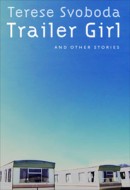(Most) Thursdays (sometimes Fridays) bring a post about a paperback book.
 Terese Svoboda’s Trailer Girl and Other Stories first appeared in 2001, and it will soon be republished by the University of Nebraska Press. The title novella is the anchor here, followed by 16 very short stories over the course of about 80 pages.
Terese Svoboda’s Trailer Girl and Other Stories first appeared in 2001, and it will soon be republished by the University of Nebraska Press. The title novella is the anchor here, followed by 16 very short stories over the course of about 80 pages.
Trailer Girl is told from the perspective of an unnamed woman who lives in a trailer park (her neighbors call her “Trash Lady” because on Tuesdays she cleans up the windblown junk that gets caught in a fence). The fence stands in front of a gully, where cattle roam, and where the narrator believes a “wild child” lives, “a little girl in red with no shoes and her hair all stuck out, fine like mine.”
There she is, and there she is not, the cows giving her red shirt or sweater room and then squeezing it out of sight just like that.
All I see is that she is not looking at me. It is like an accident that I see her at all. I almost try not to look because then I see more.
The narrator tries to convince others that the girl exists, but she is wildly unreliable, having been shuffled to several foster homes in her own childhood and having spent time in psychiatric institutions:
All those years before, moving from parent to parent, made me ready for an institution and its ways, because those parents, well. One of them did want me so I had a baby but then of course I couldn’t stay, I had to go away and take that baby with me and then of course there were no more parents but me.
Svoboda draws a dismal, oblique but convincing portrait of childhood abuse (which some kids in the trailer park are currently suffering through) and its lasting effects:
I thought I grew up in homes but really I grew up after, in the places that I was checked into. In the homes I had to look after myself and sometimes parents too so it was hard to have time to grow up. In this place that was for the not-quite-right, the places for the listing left or right, I was not supposed to look after anyone, just to set and be, which makes you crazy enough to figure out how not to want anyone to look after you ever, and to grow up.
The excerpts above hint at but don’t fully convey Svoboda’s fractured, often difficult style. She has published several volumes of poetry, and on occasion she seems more concerned with setting down words the way they sound in her head than with whether or not they’re comprehensible that way. Many sentences require rereading, not in the good way. She can also make a fetish of circuity, as when she describes the laundry building as “also the place where you bang at buttons to make flippers bounce balls against gravity and in and out of cups under glass.” I think she means “play pinball.”
But what can be frustrating about Svoboda’s style is also what makes it singular. The sad and menacing mood she conjures is potent, and it continues throughout the stories that make up the rest of the collection.

